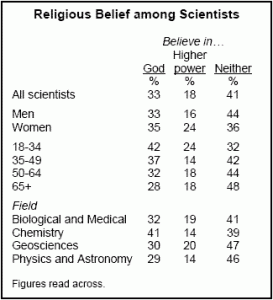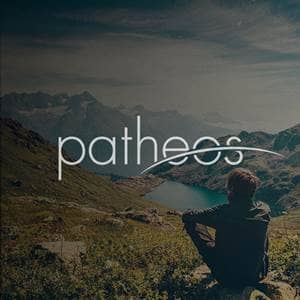Razib at Gene Expression has the lowdown on a new survey comparing social, political and religious attitudes of scientists with the general public. Unsurprisingly, there’s a huge gulf between the two groups. While 41% of the scientists said they didn’t believe in god or in a high power, just 4% of the general public said the same. There’s one statistic that is rather unexpected, however. As you can see in this table, younger scientists are more likely to be religious than older ones. That’s the reverse of what you see in the general population.
There’s one statistic that is rather unexpected, however. As you can see in this table, younger scientists are more likely to be religious than older ones. That’s the reverse of what you see in the general population.
A similar thing was seen in a study published back in 2007 by Elaine Ecklund at SUNY. In a survey of of 1,500 academics, she found that those aged under 35 were 50% more likely to say that they believed in god or attended religious services compared with those aged over 45.
Ecklund thinks that this might indicate a trend towards increasing religiousness in academics. After all, adults don’t often change their religious beliefs. So as the younger academics get older and the older ones retire (or die), you would expect the number of believers to increase. But I have one niggling doubt.
Ecklund also thinks (and she’s probably right) that the reason academics are less religious is because academia attracts freethinkers. It’s not so much that the facts you learn as a professional biologist tease you away from religion, it’s more that people who aren’t that wowed by religion are more likely to become biologists (see Matt Young’s recent post on this over at Panda’s Thumb).
So I wonder about the age effect. Could it simply be that there’s a selective process at work here? Perhaps religious scientists simply don’t stay in the profession after their PhD and maybe one or two post-docs.
For this to be true, however, you would expect there to be fewer older academics than younger. Stats on that are hard to come by. The NSF publishes comprehensive stats on just about everything other than the age of university-employed scientists. Ecklund doesn’t break down the age demographics in her survey. The Pew Survey does (p 95), and over half of the scientists they surveyed (selected from members of the AAAS) are actually over 50!
So I’m not sure what can be concluded from the age profiles of non-religious scientists. Evidence that scientists are bucking the general secularizing trend, or an interesting insight into workplace peer pressure?
_______________________________________________________________________________________
![]()
Ecklund, E., & Scheitle, C. (2007). Religion among Academic Scientists: Distinctions, Disciplines, and Demographics Social Problems, 54 (2), 289-307 DOI: 10.1525/sp.2007.54.2.289
 This work by Tom Rees is licensed under a Creative Commons Attribution-Share Alike 2.0 UK: England & Wales License.
This work by Tom Rees is licensed under a Creative Commons Attribution-Share Alike 2.0 UK: England & Wales License.














